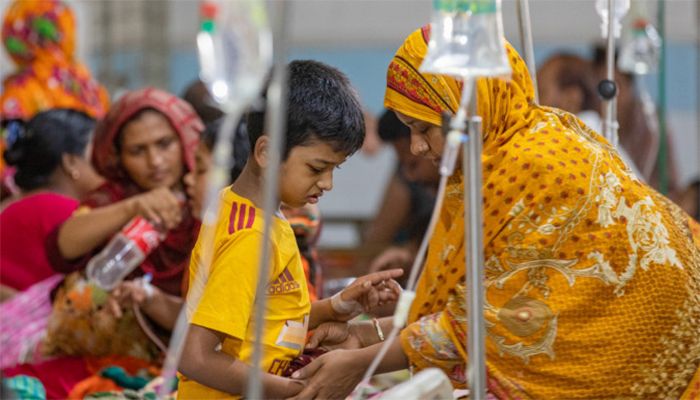
Desk Report
Publish: 12 Aug 2023, 04:19 pm

Photo: Collected
The UN World Health Organization (WHO) said on Friday that dengue fever cases have significantly increased in Bangladesh, and they are urging people to wear long sleeves and use insect repellents to reduce their personal contact to mosquitoes.
According to the UN health agency, the epidemic, which has been spreading quickly since late June, has resulted in a total of 69,483 confirmed cases, 327 associated fatalities, and a case fatality rate of 0.47 percent between 1 January and 7 August. According to WHO, cases were recorded from each of the 64 districts in the nation.
43,854 cases and 204 deaths were recorded in July alone, making up 63% of all cases and 62% of all fatalities. The present outbreak's seriousness is underscored by the sudden rise in numbers, which is unparalleled during the previous five years.
According to WHO, "the higher incidence of dengue is occurring in the context of an unusual episodic amount of rainfall, combined with high temperatures and high humidity, which have increased the number of mosquitoes throughout Bangladesh."
Most dengue patients experience minimal or no symptoms and recover in two weeks. Rarely, dengue can be fatal due to its severity. Symptoms often appear four to ten days after infection and continue for two to seven days, if any at all.
High temperature (40°C, or 104°F), severe headache, eye discomfort, joint pain, nausea, vomiting, swollen glands, and rash are just a few possible symptoms, according to the WHO.
In addition to severe stomach pain, continuous vomiting, quick breathing, bleeding gums or nose, weariness, restlessness, blood in the vomit or stool, extreme thirst, pale and chilly skin, and a weak sensation, severe dengue symptoms frequently appear after the fever has subsided.
Those who have these serious symptoms ought to contact a doctor straight soon.
The virus dengue, which is spread by mosquito bites, has long been a problem in tropical and subtropical areas. The main carriers of the illness are the mosquitoes Aedes aegypti and Aedes albopictus. For the remainder of its life, an infected mosquito can continue to spread the virus.
Although there isn't a particular therapy for dengue right now, mortality can be greatly decreased with early discovery and the right medical care for case management.
The treatment of pain symptoms is the main priority, according to WHO. To manage pain, acetaminophen (paracetamol) is frequently used. Ibuprofen and aspirin are examples of non-steroidal anti-inflammatory medications that have to be avoided since they might raise the risk of bleeding.
Bangladesh's health authorities have established a dedicated dengue control room to collect data and coordinate at the national level, with additional control rooms in all districts and medical college hospitals.
Six hospitals assigned for the management of Covid-19 patients in the capital, Dhaka, have been repurposed for dengue case management, and dedicated dengue wards and dengue corners have been established in medical college hospitals.
Authorities are also distributing intravenous saline and other supportive drugs to healthcare institutions, educating healthcare professionals, and boosting up laboratory testing, risk communication, community participation, and surveillance.
Due to the growing number of cases, high case fatality rate, and wide geographic dispersion of infections, WHO rated the national dengue risk as "High".
In order to manage mosquito populations and lessen human-vector interaction, the UN health agency recommended integrated vector management (IVM), which included eliminating possible breeding grounds, cutting down on vector populations, and limiting individual exposure.
Specific actions involve vector control strategies for larvae and adult mosquitoes and source reduction, especially of water storage practices, and include covering, draining and cleaning household water storage containers on a weekly basis, using insecticide-treated nets and indoor space spraying (fogging).
At an individual level, protective measures include topical application of repellents to exposed skin or treatment of clothing, and the use of long sleeves shirts and pants; use of household insecticide aerosol products or mosquito coils, as well as window and door screens, which can reduce the probability of mosquitoes entering the house.
Subscribe Shampratik Deshkal Youtube Channel
Topic : Health WHO Dengue Bangladesh Dengue symptoms
© 2024 Shampratik Deshkal All Rights Reserved. Design & Developed By Root Soft Bangladesh